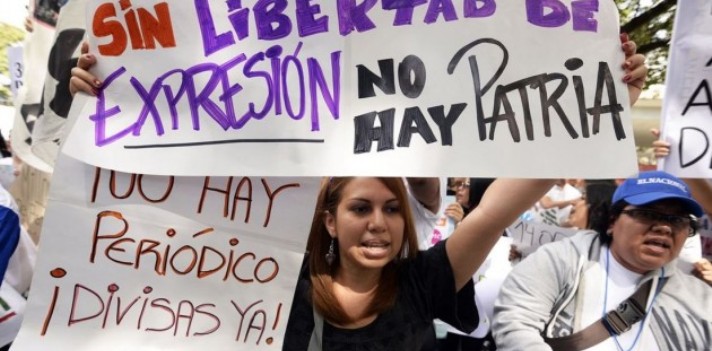
EspañolOn Friday, a judge in the southern Venezuelan state of Bolívar sentenced David Natera Febres, editor of Ciudad Guayana’s Correo del Caroní, a regional newspaper, to four years in prison for defamation and libel.
The newspaper editor allegedly used slander in news coverage of a 2013 corruption scandal involving CVG Ferrominera del Orinoco, a state-owned company that operates in the iron-mining sector.
Correo del Caroni’s investigation revealed that Colonel Juan Carlos Álvarez Dionisi, General Director of Military Counterintelligence (DGCIM), used extortion against CVG Ferrominera del Orinoco’s senior management and its contractors.
According to the reports, military officers extorted directors of the state-owned company as well as regional businessmen. They received payments in exchange for excluding them from an investigation led by Alvarez Dionisi against a “mafia” that allegedly dominates the regional iron trade.

Natera Febres was also fined 1,137 tax units and the banned from publishing news related to a regional businessman, who is the the plaintiff in the case. Until the ruling is confirmed, the judge banned Natera Febres from leaving the country and required him to report to the authorities every 30 days.
According to the prosecution, “any media outlet must await the judgment of a court order to report a case of corruption.”
Reporting Is Not A Crime
Venezuelan NGOs, journalists, politicians, and human rights activists condemned the measure against Natera Febres. The judge’s ruling, they claimed, violated the right to freedom of expression and journalists’ ability to deliver timely information.
The Venezuelan Press and Society Institute stated that this lawsuit represents a risk to journalism.
Desde 2013, Ipys Venezuela ha insistido que la demanda contra @CorreodelCaroni es abusiva y significa un riesgo para el periodismo
— IPYS Venezuela (@ipysvenezuela) March 11, 2016
“Since 2013, IPYS Venezuela has insisted that the lawsuit against Correo del Caroní is abusive and signals a risk for journalism.”
Meanwhile, Public Space, an NGO, declared that the justice system in Venezuela is violating the right to information. It adds that the “sentence was written before the trial,” which is “a premeditated outrage.”
Sistema judicial se usa para impedir el derecho a la información de los venezolanos con la coerción institucionalizada. #InformarNoEsDelito.
— Espacio Público (@espaciopublico) March 11, 2016
“The judiciary is used to prevent Venezuelans from exercising their right to information through institutionalized coercion. #ReportingIsNotACrime”
The Press Workers Union called the conviction itself a criminal act, asserting that the ruling seeks to make independent journalism “kneel down” before the government in Venezuela.
La condena contra director de @CorreodelCaroni es criminal. Pretende poner de rodillas al periodismo independiente #InformarNoEsDelito
— SNTP (@sntpvenezuela) March 11, 2016
“The sentence against Correo del Caroní’s editor is criminal. It intends to kneel down independent journalism #ReportingIsNotACrime”
According to the Venezuelan Press and Society Institute website, there were 2,018 violations of press freedom in Venezuela from 2015 until this March 11, 2016.
Public Space, which records cases of violations of freedom of expression in Venezuela, registered 93 cases of intimidation, 56 cases of verbal harassment, 47 of censure, 32 cases of aggression, 2 legal restrictions, 21 administrative restrictions, 18 cases of judicial harassment and 17 threats against journalism so far in 2015.
 Versión Español
Versión Español













